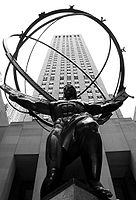
Ayn Rand's 1957 book Atlas Shrugged became the main source for her philosophy called objectivism, defined by individual rational self-interest and laissez-faire capitalism. This philosophy has been cited as a source for a lot of Republican or Libertarian thought (not my native land), so I attempted to delve into the literature for a deeper understanding.
I disagree with the foundations of her philosophy. In economics, a public good is a non-excludable and non-rivalrous good, for example: street lamps, public parks, bridges etc. The author relies so much on the idea that capitalism and competition will solve all problems, that she essentially denies the existence of any public goods. She implies that acting in one's own self-interest is the only way to success or happiness and that neither community action nor non-profits can deliver any sort of positive benefit to society. Here, she criticizes (through the character Henry Rearden) the idea of a non-profit organization or charity:
"'I'm trying to raise money for Friends of Global Progress' [Phillip said.]
Rearden had never been able to keep track of the many organizations to which Philip belonged, nor to get a clear idea of their activities. He had heard Philip talking vaguely about this one for the last six months. It seemed to be devoted to some sort of free lectures on psychology, folk music and co-operative farming. Rearden felt contempt for groups of that kind and saw no reason for closer inquiry into their nature" (Rand, 41).
And here, Dagny Taggert recollects the positive qualities of grandfather, who started the nation-wide railroad system:
"Nathaniel Taggart was a man who never accepted the creed that others had the right to stop him. He set his goal and moved toward it, his way as straight as one of his rails. He never sought any loans, bonds, subsidies, land grants or legislative favors from the government. He obtained money from the men who owned it, going from door to door- from the mahogany doors of bankers to the clapboard doors of lonely farmhouses. He never talked about the public good. He merely told people that they would make big profits on his railroad, he told them why he expected the profits and he gave his reasons. He had good reasons" (Rand, 59).
The story in Atlas Shrugged is fascinating and Rand's writing is excellent, but I found myself disagreeing with the pervasive notion that no one can ever know or act on something good for society. I can think all too easily of examples: education, lighthouses, transportation, vaccinations, clean air, community centers ... the list goes on.
"'I'm trying to raise money for Friends of Global Progress' [Phillip said.]
Rearden had never been able to keep track of the many organizations to which Philip belonged, nor to get a clear idea of their activities. He had heard Philip talking vaguely about this one for the last six months. It seemed to be devoted to some sort of free lectures on psychology, folk music and co-operative farming. Rearden felt contempt for groups of that kind and saw no reason for closer inquiry into their nature" (Rand, 41).
And here, Dagny Taggert recollects the positive qualities of grandfather, who started the nation-wide railroad system:
"Nathaniel Taggart was a man who never accepted the creed that others had the right to stop him. He set his goal and moved toward it, his way as straight as one of his rails. He never sought any loans, bonds, subsidies, land grants or legislative favors from the government. He obtained money from the men who owned it, going from door to door- from the mahogany doors of bankers to the clapboard doors of lonely farmhouses. He never talked about the public good. He merely told people that they would make big profits on his railroad, he told them why he expected the profits and he gave his reasons. He had good reasons" (Rand, 59).
The story in Atlas Shrugged is fascinating and Rand's writing is excellent, but I found myself disagreeing with the pervasive notion that no one can ever know or act on something good for society. I can think all too easily of examples: education, lighthouses, transportation, vaccinations, clean air, community centers ... the list goes on.
 RSS Feed
RSS Feed